MercoPress. South Atlantic News Agency
Fisheries
-
Monday, October 3rd 2011 - 07:46 UTC
Eight countries agree to giant shark sanctuaries banning commercial fishing
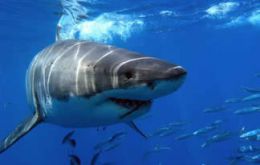
Leaders from eight countries launched an initiative to prevent the extinction of sharks, symbolizing the latest development in the growing movement to safeguard the ocean's top predator. Members of the coalition committed to a declaration supporting the development of sanctuaries that end commercial shark fishing in their national waters.
-
Monday, October 3rd 2011 - 07:40 UTC
Uruguay/Argentina agree to hake spring ban and limit annual catch to 50.000 tons
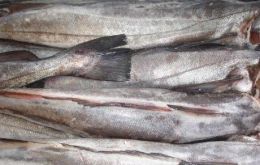
Uruguay and Argentina agreed on a three months ban for the hake fisheries in the jointly shared maritime zone with the purpose of protecting juveniles and contribute to the conservation of the resource.
-
Friday, September 30th 2011 - 05:55 UTC
Falklands examines report on alternative ways for fishing licence fees
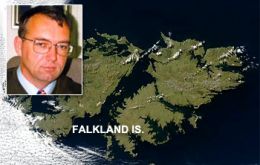
Alternative ways to charge Falklands’ fishing licence fees have been examined in a report presented to representatives of the fishing industry as well as Member of the Legislative Assembly Gavin Short and the Director of Natural Resources John Barton this week.
-
Friday, September 30th 2011 - 05:52 UTC
New Zealand involves the Navy in high seas fisheries rules compliance

New Zealand Fisheries and Aquaculture Minister Phil Heatley has acknowledged the crew of HMNZS Wellington with a presentation to mark the first ever high seas fisheries compliance operation involving the NZ Navy’s new offshore patrol vessels (OPVs).
-
Wednesday, September 21st 2011 - 16:37 UTC
Rare glimpse into the (promiscuous?) sex life of California deep sea squid

Scientists have gained a rare glimpse into the sex life of the mysterious deep-sea squid. By studying footage taken by underwater vehicles, US researchers have found that this rarely seen creature will often engage in same-sex mating.
-
Friday, September 9th 2011 - 23:23 UTC
Deep sea fishing is ‘unsustainable’; efforts should concentrate on ‘productive local waters’

A team of marine scientists is urging an end to most commercial fishing in the deep sea and instead recommending fishing in more productive and local waters. In their analysis published online in the journal ‘Marine Policy’, the team shows that all deep-sea fisheries are unsustainable.
-
Friday, September 9th 2011 - 18:49 UTC
Four seriously injured when Korean fishing vessel catches fire in Montevideo
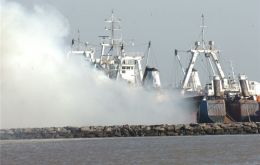
Four crewmen seriously injured and a total loss was the result of a fire that broke out Thursday night in a Korean flagged fishing vessel docked in the port of Montevideo and was still burning Friday morning.
-
Wednesday, September 7th 2011 - 11:01 UTC
King crabs found on the edge of Antarctica as a result of warming waters

King crabs have been found on the edge of Antarctica, probably as a result of warming in the region, scientists say. Writing in the journal Proceedings B, scientists report a large, reproductive population of crabs in the Palmer Deep, a basin cut in the continental shelf.
-
Friday, September 2nd 2011 - 22:22 UTC
Squid season over in the Argentina/Uruguay common fishing zone
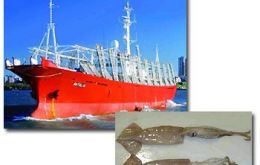
The Argentine/Uruguay Joint Technical Commission for Maritime Front (CTMFM) ordered on Wednesday 31 August the closure of the squid (Illex argentinus) fishing season in the Common Fishing Zone.
-
Thursday, August 18th 2011 - 21:01 UTC
Argentina lowers export tariffs for processed hake, shrimp and squid
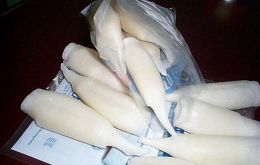
Argentina lowered fisheries’ export tariffs to all processed goods made out of hake, squid and shrimp. The measure applies for six months and makes effective the promise from Economy Minister Amado Boudou earlier in the month.
